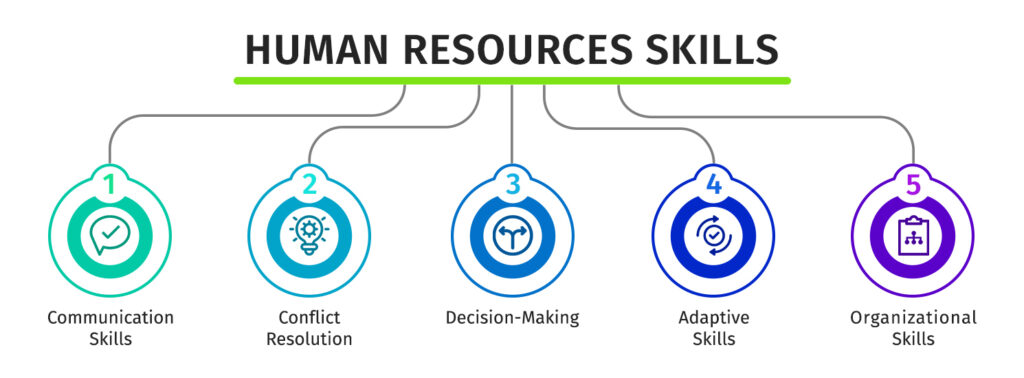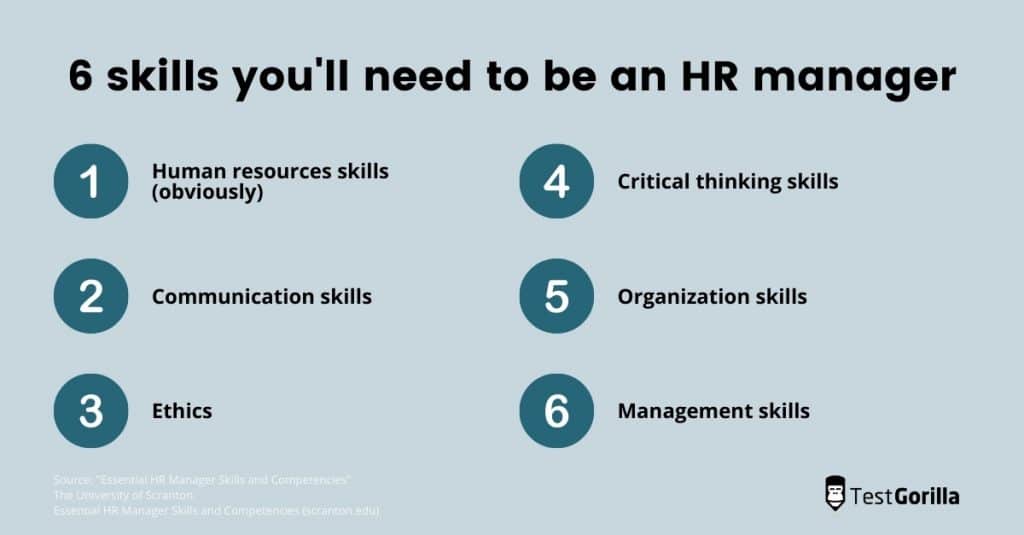The most important skills you need as an HR manager
Published

Human resources employees are an essential part of any company. In a large company, the HR manager is responsible for overseeing a team of HR representatives responsible. In a small company, a single person may handle all HR functions.
Whether you are hiring an HR manager for a large or small company, it is important to know what skills an HR manager should have. Find out which HR manager skills you can't compromise on when looking for someone for this role.
What is an HR Manager?

Those : hr.university
An HR manager is for them Planning, directing, coordinating and developing strategies and activities responsible for the employees of the human resources department of a company. As head of the department, the HR manager oversees:
- personnel manager
- HR-Generalist
- HR business partner
- HR-Analyst
Your daily tasks may include:
- Planning, leading and managing human resources initiatives
- Oversee training, benefits and employee relations
- Advice from managers in questions of labor law and company policy
- Ensuring employees comply with company policies
- Advising management on maintaining workplace culture
- Reporting HR progress to the Vice President and company stakeholders
The most important skills an HR manager should have

Those : testgorilla.com
HR managers play a crucial role in your company. That's why you should pay attention to certain skills when hiring. Think carefully about what interview questions you ask candidates to find out these HR-specific skills so you can hire the most suitable HR manager for the job.
1. Communication skills
An HR manager should have strong communication skills, both verbal and written. They must have good writing skills as they will be responsible for processing large amounts of data and paperwork. An HR manager must send professional emails, draft company policy-setting documents, and record information about employee compliance behavior.
HR managers must have the skills to verbally communicate company policy and enforce personnel decisions.
2. Relationships with employees
HR managers are responsible for motivating, advising and guiding HR employees and other managers in the company towards common goals. The person you hire for this role should have strong interpersonal skills that make it easier to have difficult conversations with employees when they violate company policy.
The HR manager should have the confidence to manage relationships with employees at all levels of the company.
3. Training
HR managers are heavily involved in the onboarding process, i.e. H. in the process in which the company hires a new employee and brings them up to speed. The HR manager can delegate the actual interaction with new employees to an HR manager, but must oversee the process.
Since the HR manager is one of the first points of contact for new employees, he or she sets the tone for the company culture. It should leave a positive impression and create a sense of trust among new employees so that they feel comfortable joining the HR department share their concerns.
4. Scheduling skills
An HR manager must have a high level of organizational skills as scheduling is an integral part of his job. As the head of human resources, the HR manager oversees the shifts and PTO of other HR employees. He must take into account work regulations, requests for time off and the availability of employees.
5. Knowledge of workers' compensation
The human resources department and its HR manager are responsible for efficiently processing employee compensation claims to avoid lawsuits against the company. If an employee is injured at work, they can file a compensation claim to cover their medical expenses and time away from work.
The HR manager ensures that the company has an appropriate insurance policy so that any claims can be processed and resolved promptly. He must also have extensive knowledge of local labor laws and federal laws. Be sure to ask HR manager candidates if they are familiar with employee insurance policies and the compensation process.
6. Project management
The HR Manager oversees a dynamic department with various projects. Whether it's an inclusion initiative or developing resource plans, project management skills are essential to success in this profession.
Within the scope of the project manager, there are several subsets of skills that the HR manager should demonstrate. This includes:
- Budgeting Skills: The HR Manager manages the finances and resources of the HR department.
- Time management skills: The HR manager needs to divide his time between different projects and delegate accordingly to ensure timely completion.
- Leadership Skills: The HR Manager is a decision maker for the department and acts as an authority on company goals. He must be respected and show good leadership qualities in order to gain the trust of other employees.
7. Human Resources Information Software
A Human Resource Information System (HRIS), sometimes called HRMS (Human Resource Management System), is an important software that an HR manager should be familiar with when applying for the job. The system combines human resources and information technology to meet a company's core human resources needs and improve productivity.
The system is designed to collect data about the company's employees and manage all issues related to human resources initiatives. Knowledge of HRIS software allows for faster processing and extraction of current HR data.
Education and training of the HR manager

Those : hrdailyadvisor.blr.com
In addition to these skills, your HR manager will need a certain level of training and experience to qualify for the position. When creating your job description, be sure to clearly outline what training or certifications you expect from applicants. This allows you to narrow your search and exclude applicants who do not meet these requirements.
The HR manager should have at least a bachelor's degree and several years of experience in a related field. The bachelor's degree does not necessarily have to be in the field of human resources, but should be useful for the position, e.g. B. in the areas of business administration or finance.
A Master of Science in Human Resources or professional certification is an advantage. These certifications should come from recognized institutions, such as the HR Certification Institute or the International Public Management Association for Human Resources.
The ideal candidate for an HR manager position should also have a desire for ongoing professional development. Resumes with recent additional courses in conflict management or health care administration indicate motivation and attention to detail.
Years of practical experience are a prerequisite for success as an HR manager. There are elements of the position that can only be learned in a work environment and not in a training environment. Therefore, applicants should have at least one year of experience as an HR manager or several years of experience in a role that reports directly to an HR manager, e.g. B. as an HR manager or generalist.








